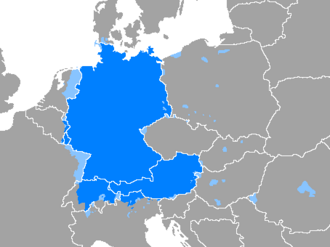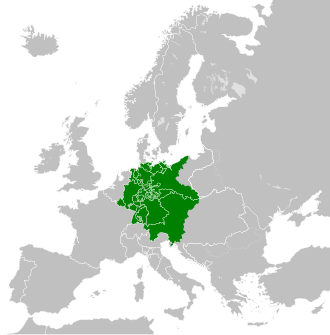Discover Your Roots
SIGN UPDiscover Your Roots
SIGN UPGerman is a male name of English origin, meaning "From Germany." It is often the Slavic form of Herman. The name German is associated with individuals from various fields, including art, music, humanities, social sciences, politics, and sports. Notable personalities with the name German include Soviet Russian composer German Galynin, Russian economist German Gref, Ukrainian politician German Galushchenko, American distance runner German Fernandez, and Russian cosmonaut German Titov. Additionally, there have been Serbian patriarchs with the name German. The name German is also linked to historical figures such as English Catholic martyr German Gardiner and Russian businessman and environmentalist German Sterligov. Whether in the arts, academia, politics, or sports, individuals with the name German have made significant contributions in their respective fields.

German, known as Deutsch, is a widely spoken West Germanic language in Western and Central Europe. It is the most spoken native language within the European Union and is the official or co-official language in several countries, including Germany, Austria, Switzerland, and others. It also holds official status in regions of Italy, Belgium, and Luxembourg, and is a recognized national language in Namibia. German has significant influence in various fields such as philosophy, theology, science, and technology, and is the second-most widely spoken Germanic language after English. It is also widely taught as a foreign language, especially in continental Europe and the United States. The language has a rich history and has evolved from Old High German, with a diverse spectrum of dialects existing in Europe and other parts of the world. German is an inflected language with strong and weak verbs, and its vocabulary derives from various sources including ancient Germanic, Latin, Greek, French, and English. It is classified as an Indo-European language belonging to the West Germanic group, with dialectal subdivisions such as High German, Low German, and Low Franconian.

The German Confederation, also known as Deutscher Bund, was an alliance of 39 predominantly German-speaking sovereign states in Central Europe. Formed in 1815 as a replacement for the dissolved Holy Roman Empire, it aimed to establish a strong alliance between its member states, with federal law being superior to state law. The Confederation's structure, however, was its weakness, as important decisions required unanimous agreement and its purpose was limited to security matters.The Confederation faced challenges, including opposition between the most populous member states, Austria and Prussia, and the 1848-1849 German revolutions. These revolutions sought to transform the Confederation into a unified German federal state with a liberal constitution, leading to the dissolution and re-establishment of the Federal Convention.Ultimately, the Confederation was dissolved after the Kingdom of Prussia's victory in the Seven Weeks' War over the Austrian Empire in 1866. This led to the creation of the North German Confederation under Prussian leadership, which later became the "German Empire" in 1871.Historians have viewed the Confederation as weak and ineffective, hindering the creation of a German nation-state. Its constitutional weakness lay in the principle of unanimity in the Diet and the limits of its scope, primarily as a military alliance. Despite its shortcomings, the Confederation played a significant role in the political and military landscape of 19th-century Germany.

The Channel Islands, comprised of the Bailiwick of Jersey and Bailiwick of Guernsey, were occupied by Nazi Germany for the majority of World War II, from 30 June 1940 until liberation on 9 May 1945. As the only de jure part of the British Empire in Europe to be occupied by Nazi Germany during the war, the islands experienced a period of moderate treatment initially, but conditions deteriorated, leading to near-starvation for both occupiers and the occupied by the winter of 1944–45. Despite minimal armed resistance, British forces conducted raids on the islands, and many islanders were employed by the Germans, with thousands of forced laborers imported to build defensive works. The occupation began after the demilitarization of the islands by the British government, and civilian evacuation was realized late and amid confusion. The islands' leaders maintained some authority and autonomy from the German occupiers during this challenging period.

In German-speaking Europe, personal names consist of one or several given names and a surname. The most common exceptions to the "Western order" of "given name, surname" are alphabetized lists of surnames and some official documents. Traditionally, women adopted their husband's name upon marriage, but recent legislation allows married couples to choose the surname they want to use. The most common given names are either Biblical or from Germanic names, but there has been a trend of parents picking non-German forms of names since the 1990s, influenced by international celebrities. Surnames are derived either from given names, occupations, or geographical origin. The Vorname (forename) is usually given to a child by the parents shortly after birth, with one intended for everyday use known as the Rufname. In Germany, the chosen name must be approved by the local civil registry office. Among German nobility, there was a fashion to give a large number of forenames in the early modern period. Traditionally, there are dialectal differences in the forms of hypocorisms, especially visible in the forms of popular given names. Surnames were gradually introduced in German-speaking Europe during the Late Middle Ages and are generally classified into four groups by derivation: given names, occupational designations, bodily attributes, and toponyms.

German Molina Moreno, more commonly known as Kuya Germs, was a multi-talented Filipino personality celebrated for his diverse contributions to the entertainment industry. Born on October 4, 1933, Moreno's career spanned across television hosting, acting, comedy, talent management, production, writing, and directing. He began his journey as a janitor and telonero at the Clover Theater, eventually transitioning into a successful comedian and actor. Moreno's notable achievements include hosting popular shows like GMA Supershow and That's Entertainment, as well as producing TV films and establishing the Eastwood City Walk of Fame. Throughout his career, he received numerous accolades and established awards, leaving a lasting impact on the Philippine entertainment scene. Additionally, Moreno was known for his political views and support for former President Ferdinand Marcos. His legacy continues through the achievements of his adopted son, Federico Moreno, and his nephew, John Nite, who followed in his footsteps as a TV host. Unfortunately, Moreno passed away on January 8, 2016, leaving behind a profound influence on the industry and the lives he touched.
All images displayed on this page are sourced from Wikipedia or Wikimedia Commons.We use these images under their respective Creative Commons or public domain licenses. Wherever applicable, author attributions and license information are provided. If you believe an image is used incorrectly or outside its license terms, please contact us so that we can review and correct the issue.